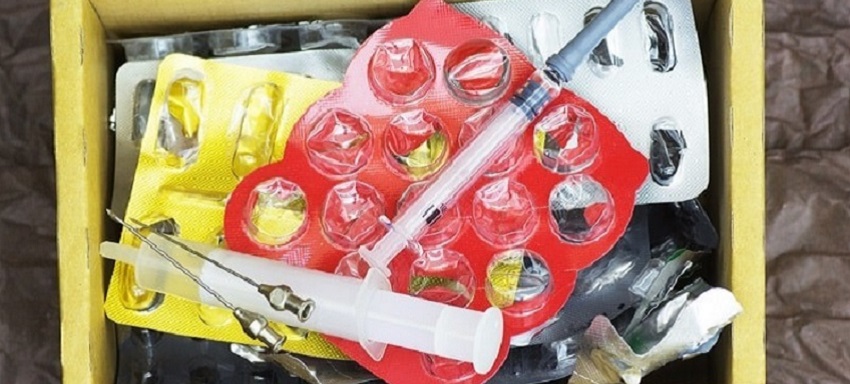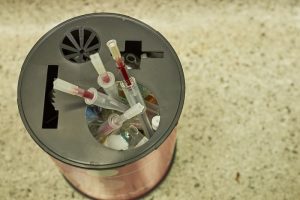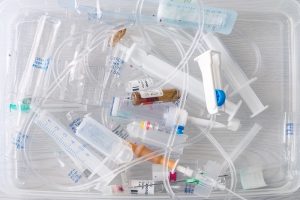
If your facility generates a small volume of medical waste, you’re probably aware that there are many local and federal regulations regarding medical waste. From the workplace to environmental safety, the number of guidelines you must follow in handling medical waste can be overwhelming. Therefore, most facilities opt to let a professional medical waste service take care of the disposal process for them. Medical waste disposal by mail is an easy and compliant method for small volumes.
Medical waste disposal companies can accommodate facilities of all sizes, from research hospitals to tattoo parlors. Because each facility produces unique volumes of medical waste, disposal companies have services to meet a variety of needs. For small or inconsistent amounts of medical waste, facilities often choose to dispose of their waste with flexible medical waste disposal by mail.
What Types of Medical Waste Can I Mail Back?
Generally, the process of mail-back disposal is a relatively simple one when working with a medical waste disposal company. Your service provider can help you assess whether or not mail-back services are the best option for you, as well as what materials you’ll need to start.
Because you need to sort and package some types of waste differently, it’s important to determine what types of medical waste you’ll be dealing with. Below are a few different types of medical waste that you can mail.
Sharps Medical Waste

Sharps are items such as needles, lancets, syringes, orthodontic wires, scalpels, glass, etc. They pose a risk of spreading infectious diseases and can easily cause injury. You must sort them into a separate, hard-shell, lockable container that has proper labels.
Most businesses need to have sharps storage containers in the workplace for employee safety. Households that regularly administer medications with needles—such as insulin for diabetics—benefit from having a sharps container as you can’t simply throw these items in the trash.
Soft Medical Waste

Soft medical waste includes but isn’t limited to, any paper products, gauze, gloves, IV tubing (without needles), patient gowns, bandages with dried blood or body fluids, personal protective equipment, and plastic products.
Some of your medical waste may be too hazardous to mail, and every state defines its biohazardous waste criteria differently. It’s important to let your provider know if you feel that you have any biohazardous waste, because you may not be permitted to mail some of these wastes in.
 Pharmaceutical Waste
Pharmaceutical Waste
Many pharmacies, health clinics, and residences find themselves with expired medications. Simply tossing the medications in the trash can introduce toxic chemical substances into the environment and may put others, such as infants, at risk.
Some pharmaceuticals must legally undergo treatment before disposal. In addition, any pill bottles you throw in the trash most likely don’t get recycled. Mail-back services are cost-effective solutions for facilities with pharmaceutical waste and pill bottle recycling, as this waste is typically small in volume.
Dental Amalgam Waste

Dental amalgam is a material used in fillings and is commonly referred to as a silver filling. It contains liquid mercury and poses a threat to those exposed to it. Because of its mercury content, you shouldn’t throw dental amalgam away in the trash but can dispose of it with a mail-back service.
How Medical Waste Disposal by Mail Works
After you’ve assessed which types of medical waste you have, your disposal company will provide the correct materials needed to store and ship your waste.
Once you have your materials, you’re ready to begin the mail-back medical waste disposal process:
- Sort and Collect Your Waste: The disposal company will provide you with detailed instructions on which types of wastes are permitted to be placed in each specific receptacle they have provided. Be certain to adhere to all sorting and collection recommendations. One mistake could result in severe medical waste disposal violations. We recommend checking that their instructions adhere to local laws and posting the instructions near every receptacle.
- Package Your Waste Container: Order your mail-back kit online. You’ll receive all appropriate shipping materials and instructions as to how to package your waste. You must properly label all medical waste, so be sure to follow the instructions carefully.
- Fill Out and Sign the Destruction Manifest: These forms are not only necessary for safety compliance—they allow you to conveniently keep track of your service history. Fill out any information, sign, and be sure to keep your customer copy. Once your materials have reached their destination, your provider will complete the form and send it back to you.
- Ship Your Materials and Wipe Your Hands of a Job Well Done
You can store most medical waste for quite a while. You’re free to fill up your container until you’re ready to mail it. You won’t waste money on a regularly scheduled pickup service for a small volume of waste, but you have the option to send in your containers on a regular schedule if you’d like—even if they aren’t filled up.
What Regulations Apply to Transporting Medical Waste?
 There are inherent risks in the shipping and transportation of any hazardous materials. Therefore, it’s vital to follow your service provider’s instructions carefully. There may also be stringent local regulations in place, so be sure to do your research before choosing this option. Below are federal agencies with regulations concerning the transportation of medical waste.
There are inherent risks in the shipping and transportation of any hazardous materials. Therefore, it’s vital to follow your service provider’s instructions carefully. There may also be stringent local regulations in place, so be sure to do your research before choosing this option. Below are federal agencies with regulations concerning the transportation of medical waste.
The U.S. Department of Transportation
The Department of Transportation’s (DOT) Hazardous Materials Regulations (HMR) includes regulated medical waste in its definition of hazardous materials and offers specific guidelines for packaging and shipping these materials
According to HMR, the shipper is solely responsible for properly packaging medical waste before they transport it. All employees who deal with the packaging process must attend proper training on the process.
The United States Postal Service
The United States Postal Service (USPS) has rigorous guidelines for the packaging of medical waste. It demands that all materials be shipped through USPS-approved containers. Using a mail-back service makes this process easier because disposal companies only provide USPS-certified containers. You won’t have to worry about spending hours researching and acquiring the correct materials on your own with a mail-back service provider.
Get Free, No-obligation Quotes for Medical Waste Disposal by Mail Today
Medical Waste Pros can help you find a reliable local provider to help you select the sharps mail-back system. Leave the hard work to certified, compliant experts so you can focus on your business.
To start, fill out the form, or give us a call at (888) 755-6370 for a free quote on mail-back services. Within minutes, we’ll get you free, no-obligation quotes for your service.







